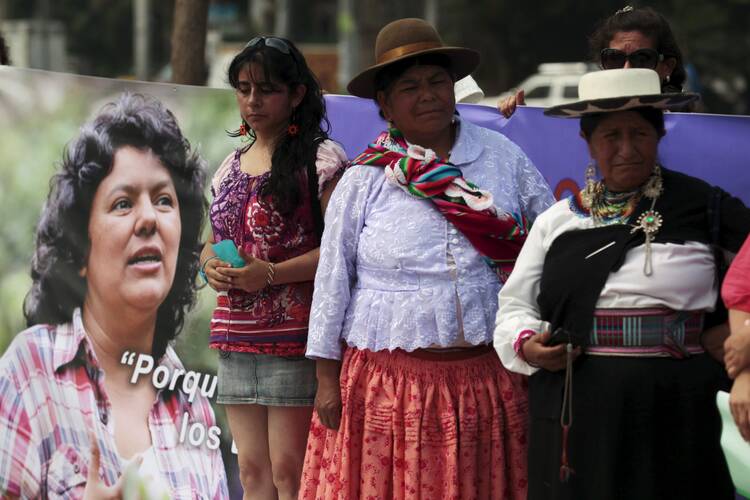Friends, family members and activists associated with the slain Honduran Berta Cáceres are calling for an independent investigation into her killing through the Inter-American Commission on Human Rights. According to Jennifer Avila, an investigative reporter for the Jesuit-supported Radio Progreso in Honduras, there is little trust in the official investigation into the homicide of Cáceres, an internationally recognized defender of the environment and indigenous communities in Honduras, because government officials had paid little attention to the last threats she had received. Cáceres and her organization, the Council of Popular and Indigenous Organizations of Honduras, had been working for years to thwart the massive Agua Zarca hydroelectric dam project.
“They are prioritizing personal issues as a cause of the crime,” Avila reports via email from Honduras. “She was criminalized by Honduran authorities because of her activism, so now it is too difficult for her family to think the same system is going to make an independent and true investigation.” Avila says investigators so far have shown a “clear interest to inculpate partners or people who were close to her so they could say it is not a political murder.”
The only witness to the crime, a Mexican activist named Gustavo Castro, has been barred from leaving Honduras, and U.N. officials have expressed concern for his safety. Castro had been shot by the same two men who murdered Cáceres after storming her home in the city of La Esperanza in western Honduras in the early morning hours of March 3; he survived by playing dead.
All of the images Castro has been shown by police as possible suspects “are from people of the same organization that Berta led,” Avila says. Meanwhile, indigenous activists and Cáceres’s family report feeling newly threatened. “They say some strange people are surrounding them in the communities, and they are afraid because they know that if there is no justice, they will be the next victims.”
The project Cáceres had been resisting at the time of her death, the Agua Zarca Dam, is planned for the Gualcarque River. It had been pushed through without consultation with the indigenous Lenca people—a violation of international treaties governing indigenous peoples’ rights. The Lenca oppose the project, which would obliterate their land and communities.
Despite the apparent assassination of Cáceres, Avila says indigenous activists she has spoken to remain as committed as ever to halting the dam project and other “developments” that trample the rights of indigenous people in Honduras.
“It is so common to hear from them, especially indigenous women, that they are not afraid to die, and that they are sure they will be next victims, but they will continue,” Avila says. “The first demand is justice for Berta and the second one is to stop the Agua Zarca project. They are asking the government to cut the dam contract and name the Gualcarque River as a national heritage [site]. They are also asking to cut every project—it could be mining or for energy production—that threaten indigenous communities.”
According to Avila, local activists hope the international community will pressure Honduran authorities into permitting an independent investigation of the killing of Cáceres. Beyond that, they ask citizens outside Honduras to “push their countries, enterprises or international funding agencies not to support projects like the dam in Rio Blanco, which is supported by the Finnish Fund for Industrial Cooperation and also receives support from U.S.A.I.D. The [indigenous] communities have the right to decide which project they accept or which not to accept, and that right is being violated in this country; that has to be an international demand, also.”








